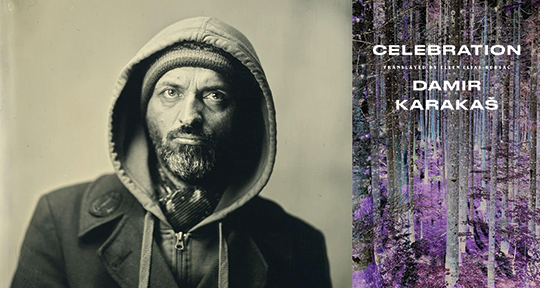Celebration by Damir Karakaš, translated from the Croatian by Ellen Elias-Bursać, Two Lines Press, 2024
An existential dilemma carries Damir Karakaš’s slim, engrossing Celebration, translated from the Croatian by Ellen Elias-Bursać. Mijo—a former soldier of the famously brutal WWII organization Ustaše—is hiding in the deep, dark woods of a forest near his home, wondering if he will ever be able to come out. Connecting the dots of this character study is an intriguing exercise in a non-chronological narrative, which begins in 1945 before working its way back to 1935, 1942, and, finally, 1928. The structure allows for a series of carefully coordinated overlaps and repetitions, soaking the disturbing story line in the consequences and repercussions of an intergenerational fascism. Flashbacks and backstories included in each section gradually develop Mijo’s character, eventually revealing the lead-up to his seclusion.
In an interview with the Center for the Art of Translation, Karakaš provides a penetrating analysis of the historical and personal background of Celebration. When describing his birthplace of Lika, he speaks of “its poverty, its harsh winters, its wolves,” as well as the pervasive nature of war in the region; his father, grandfather, and great-grandfather had all served as soldiers, and Karakaš himself too is a veteran—though he has since learned to abhor war. The static nature of such an environment informed the author’s choice of the reverse narrative, which he applies to suggest that “we are always moving in a circle,” as products of all that precedes us.

